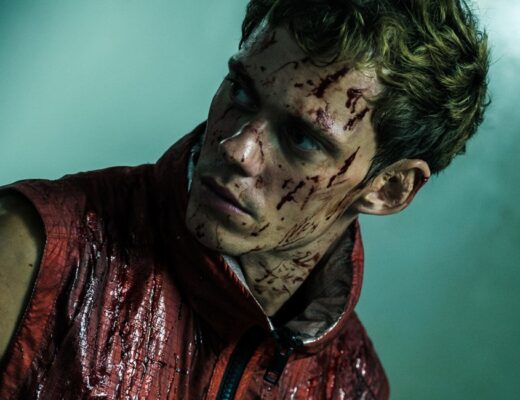Matteo Garrone’s new film Io Capitano includes a map of the exact overland path taken by its two main characters during the end credits, charting the indirect route from Dakar to Agadez and then to Tripoli (with the intention of catching a boat from there to southern Italy). It can be dismissed as a throwaway moment during a photo montage in the end credits, or perhaps a sop to less geographically-inclined Western viewers, but it’s also a sobering reminder — in a film which is predominantly sobering — that smack dab in the middle of the harrowing 6,400 km journey is a little landmass known as the Sahara Desert. It underscores the near impossibility of actually escaping poverty and merely surviving the trek undertaken by hundreds of thousands of Sub-Saharan Africans over the last decade, serving as a clinical reinforcement of the wrenching experiences of the film’s subjects. Depending on how one chooses to view the film’s conclusion, it can either be interpreted as a tribute to their perseverance or a memorial to their struggle.
We’re introduced to 16-year-old cousins Seydou (Seydou Sarr) and Moussa (Moustapha Fall), living in overcrowded homes in Senegal, surreptitiously saving money to run off to Europe together. The young men watch social media videos from countries they’ve never visited on their cell phone and dream of becoming celebrities and sending money back home to support their parents, which speaks to the level of naïveté at play; when Seydou raises the idea of leaving Dakar to find work, his mother’s scowl is so chilling he immediately tries to pass it off as a bad joke. The two teens sneak off in the middle of the night, jumping on a bus bound for Niger with the intention of securing fake passports, and are soon confronted by the first of what will be an ongoing series of shakedowns by intimidating, well-armed authority figures. With rapidly depleting funds and at the mercy of assorted underworld figures promising safe passage in relative comfort that falls well short of what’s delivered, the two young men serve as witness to a procession of nightmarish, dehumanizing scenarios. The teens are soon wandering past a column of corpses strewn across the world’s largest desert, before Moussa is dragged off to prison at gunpoint while Seydou is, in turn, tortured for months by the Libyan mafia to extort money from his family.
Evoking Gregory Nava’s El Norte, Garrone’s approach to telling this immigration tale marries unflinching naturalism with occasional detours into the fantastical; an apt way of describing the director’s filmography of late. Having exploded onto the international scene with 2008’s crime epic Gomorrah (which subsequently spawned a popular TV series), Garrone has recently been alternating between stripped-down, human-sized dramas (Dogman) and giant, FX-driven spectacles (Tale of Tales, Pinocchio), and in many respects, Io Capitano is splitting the difference between the two sensibilities. At its center is a hugely empathetic, affectation-free performance by Sarr, with the first-time actor clinging to his childlike innocence while literally accumulating the scars of his travails on his face. Reduced to calling out for his mother in his sleep — his dreams find him briefly able to return to his home in Senegal, begging for a forgiveness his mother is cruelly unable to hear — the character is continuously robbed of his innocence and faith in his fellow man, so much so that the film’s infrequent acknowledgments of kindness, such as an older hostage played by Issaka Sawadogo who takes a paternal interest in him, can be just as disorienting as the more regularly occurring instances of inhumanity.
Garrone keeps the viewer on their backfoot, allowing scenes to drift into magical realism or almost tranquil moments of grace and unexpected beauty, effectively as a reprieve from the near inescapable suffering and fear. But it also calls into question just how reliable an account this all is meant to be. Late in the film, a desperate and cash-strapped Seydou, having against all odds arrived in the port city of Tripoli and been reunited with a gravely wounded Moussa, is conscripted into being a boat pilot (hence the film’s title), and with minimal training is tasked with ferrying hundreds of refugees the 500 km to Sicily. With the boat teeming with terrified Africans packed into every inch of the rusty vessel and against a recent backdrop of seafaring disasters, we are forced to watch a scared young man placed into an impossible situation, where one of a hundred things can go catastrophically wrong. The film has, to this point, conditioned us to expect the worst and view escape with skepticism, which creates something of a conundrum with the film’s closing moments. Either we disregard our conditioning and allow for the possibility that there truly is goodness in this world, or we accept that we are living in the fantasy of a sweet young man who only wanted to provide for his family. Whether the film is meant to be a story of hope or something entirely more cautionary is left to the viewer to decide.
DIRECTOR: Matteo Garrone; CAST: Seydou Sarr, Moustapha Fall, Hichem Yacoubi, Issaka Sawagodo; DISTRIBUTOR: Cohen Media Group; IN THEATERS: February 23; RUNTIME: 2 hr. 2 min.







